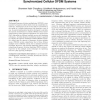Free Online Productivity Tools
i2Speak
i2Symbol
i2OCR
iTex2Img
iWeb2Print
iWeb2Shot
i2Type
iPdf2Split
iPdf2Merge
i2Bopomofo
i2Arabic
i2Style
i2Image
i2PDF
iLatex2Rtf
Sci2ools
116
click to vote
IWCMC
2006
ACM
2006
ACM
Uplink capacity comparison of non-perfect frequency synchronized cellular OFDM systems
Orthogonal frequency division multiplexing (OFDM) is very sensitive to frequency offsets which result in considerable interference. Performance of the system will be exacerbated in the uplink of a cellular deployment with frequency reuse of one. A general mathematical model is developed to calculate the amount of interference in cellular OFDM system considering frequency offset between transmitter (Tx) and receiver (Rx), depending on different multiple access and duplexing techniques. An ideal adaptive modulation scheme is applied to compare the capacity of different cellular OFDM systems. It is found that the capacity of frequency division multiple access (FDMA) system outperforms that of time division multiple access (TDMA) system due to multiuser diversity in FDMA. Moreover, time division duplexing (TDD) system outperforms frequency division duplexing (FDD) system irrespective of the multiple access techniques by exploiting time slot (TS) opposing techniques. Categories and Sub...
| Added | 14 Jun 2010 |
| Updated | 14 Jun 2010 |
| Type | Conference |
| Year | 2006 |
| Where | IWCMC |
| Authors | Shameem Kabir Chaudhury, Hrishikesh Venkataraman, Harald Haas |
Comments (0)

